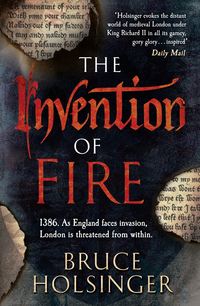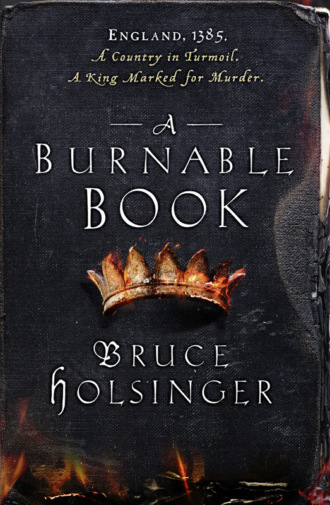
Полная версия
A Burnable Book

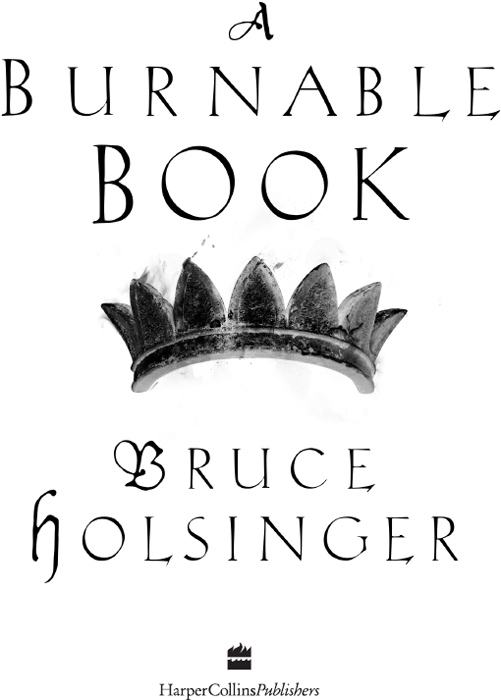
For my mother, Sheila, who taught me to write
At Prince of Plums shall prelate oppose
A faun of three feathers with flaunting of fur,
Long castle will collar and cast out the core,
His reign to fall ruin, mors regis to roar.
By bank of a bishop shall butchers abide,
To nest, by God’s name, with knives in hand,
Then springen in service at spiritus sung.
In palace of prelate with pearls all appointed,
By kingmaker’s cunning a king to unking,
A magnate whose majesty mingles with mort.
By Half-ten of Hawks might shender be shown.
On day of Saint Dunstan shall Death have his doom.
The thirteenth prophecy, from Liber de Mortibus Regum Anglorum
(‘Book of the Deaths of English Kings’)
Table of Contents
Cover
Title Page
Dedication
Epigraph
Cast of Characters
Map
Family Tree
Prologue
Part One: The Prince of Plums
Chapter One
Chapter Two
Chapter Three
Chapter Four
Chapter Five
Chapter Six
Chapter Seven
Chapter Eight
Chapter Nine
Chapter Ten
Chapter Eleven
Chapter Twelve
Chapter Thirteen
Chapter Fourteen
Chapter Fifteen
Chapter Sixteen
Chapter Seventeen
Part Two: Faun of Three Feathers
Chapter Eighteen
Chapter Nineteen
Chapter Twenty
Chapter Twenty-One
Chapter Twenty-Two
Chapter Twenty-Three
Chapter Twenty-Four
Chapter Twenty-Five
Chapter Twenty-Six
Chapter Twenty-Seven
Chapter Twenty-Eight
Chapter Twenty-Nine
Chapter Thirty
Chapter Thirty-One
Chapter Thirty-Two
Chapter Thirty-Three
Chapter Thirty-Four
Chapter Thirty-Five
Chapter Thirty-Six
Chapter Thirty-Seven
Part Three: Half-ten of Hawks
Chapter Thirty-Eight
Chapter Thirty-Nine
Chapter Forty
Chapter Forty-One
Chapter Forty-Two
Chapter Forty-Three
Chapter Forty-Four
Chapter Forty-Five
Chapter Forty-Six
Chapter Forty-Seven
Chapter Forty-Eight
Chapter Forty-Nine
Chapter Fifty
Chapter Fifty-One
Chapter Fifty-Two
Chapter Fifty-Three
Chapter Fifty-Four
Chapter Fifty-Five
Chapter Fifty-Six
Chapter Fifty-Seven
Chapter Fifty-Eight
Chapter Fifty-Nine
A Note to the Reader
Acknowledgments
About the Author
Copyright
About the Publisher
CAST OF CHARACTERS
ENGLISH ROYALS, MAGNATES, AND RELATIONS
Richard II, King, son of Prince Edward (the Black Prince)
John of Gaunt, Duke of Lancaster, brother of Prince Edward
Henry of Bolingbroke, son and heir to John of Gaunt
Joan, Countess of Kent, mother of King Richard II
Robert de Vere, Earl of Oxford
Stephen Weldon, knight of Oxford’s faction
Katherine Swynford, governess and consort to John of Gaunt, sister-in-law of Geoffrey Chaucer
Robert Braybrooke, Bishop of London
William Wykeham, Bishop of Winchester
Michael de la Pole, Baron de la Pole and Lord Chancellor of England
Isabel Syward, Prioress of St Leonard’s Bromley
OFFICERS OF THE CITY OF LONDON AND SERVANTS OF THE CROWN
Thomas Pinchbeak, serjeant-at-law
Ralph Strode, common serjeant of London
James Tewburn, his clerk
Thomas Tyle, King’s Coroner of London
Nicholas Symkok, clerk to the King’s Coroner
Richard Bickle, goldsmith of London, beadle of Cheap Ward
Thomas Tugg, keeper of Newgate Prison
Geoffrey Chaucer, controller of the wool custom
Philippa Chaucer, his wife, sister of Katherine Swynford
COMMON WOMEN OF LONDON AND SOUTHWARK
Eleanor/Edgar Rykener, maudlyn of Gropecunt Lane
Mary Potts, maudlyn of Gropecunt Lane
Agnes Fonteyn, maudlyn of Gropecunt Lane
Joan Rugg, their bawd
Bess Waller, bawd of the Pricking Bishop; mother of Agnes and Millicent Fonteyn
St Cath, maudlyn of the Pricking Bishop
TRADESMEN, FREEMEN OF LONDON AND SOUTHWARK, AND COMMONERS
John Gower of Southwark, esquire and poet
Will Cooper, his servant
Simon Gower, his son, clerk to Sir John Hawkwood
Mark Blythe, mason of Southwark
George Lawler, spicerer of Cornhull
Jane Lawler, his wife
Denise Haveryng, widow of Cornhull
Nathan Grimes, master butcher of Cutter Lane, Southwark
Tom Nayler, his first apprentice
Gerald Rykener, his second apprentice and ward; brother of Eleanor/Edgar
Millicent Fonteyn, singlewoman of Cornhull; sister of Agnes Fonteyn
Sam Varney, gravedigger
IN OXFORD
Peter de Quincey, keeper of the books of Durham
John Clanvowe, knight of the King’s Chamber
John Purvey, curate of Lutterworth, disciple of John Wycliffe
IN FLORENCE
John Hawkwood, mercenary knight, chief of the White Company
Adam Scarlett, his chief lieutenant
Jacopo da Pietrasanta, his chancellor
Giovanni Desilio, doctor of the Studium Generale, Siena
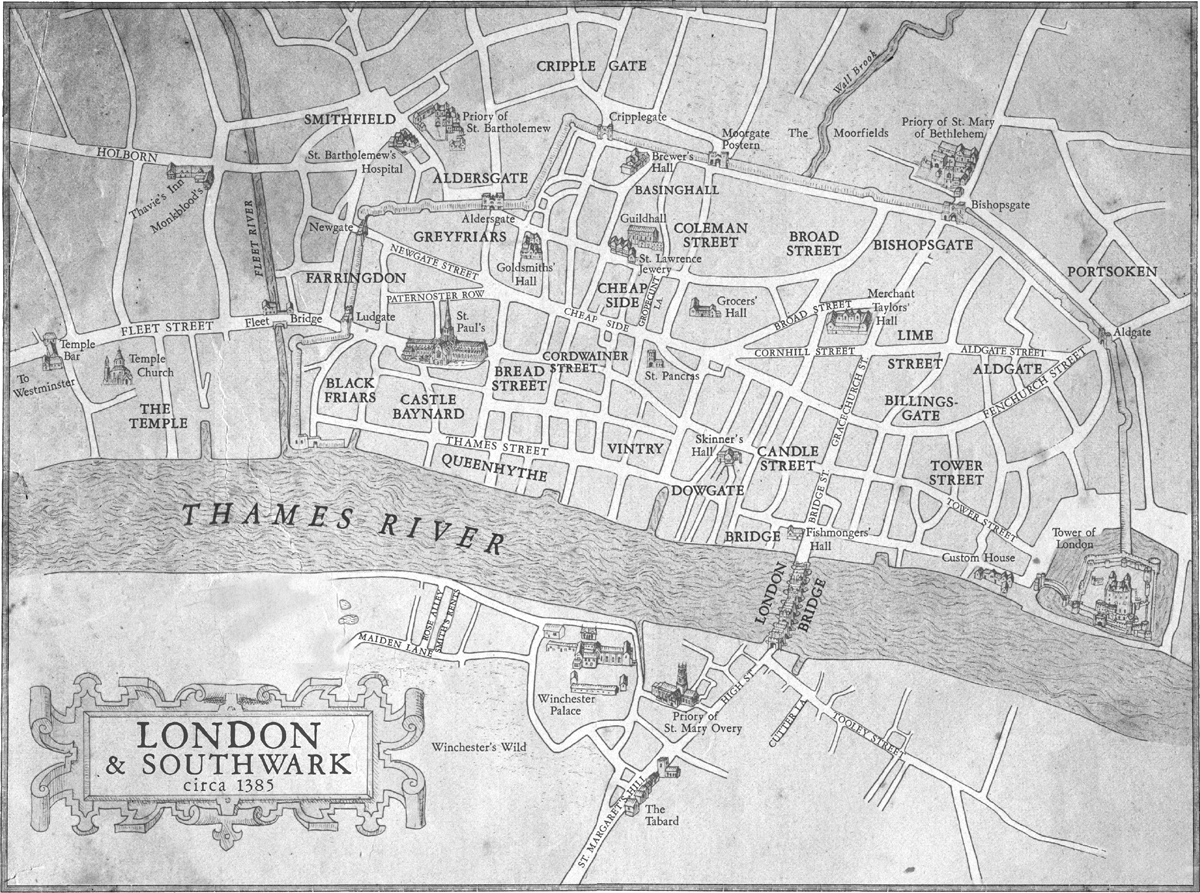
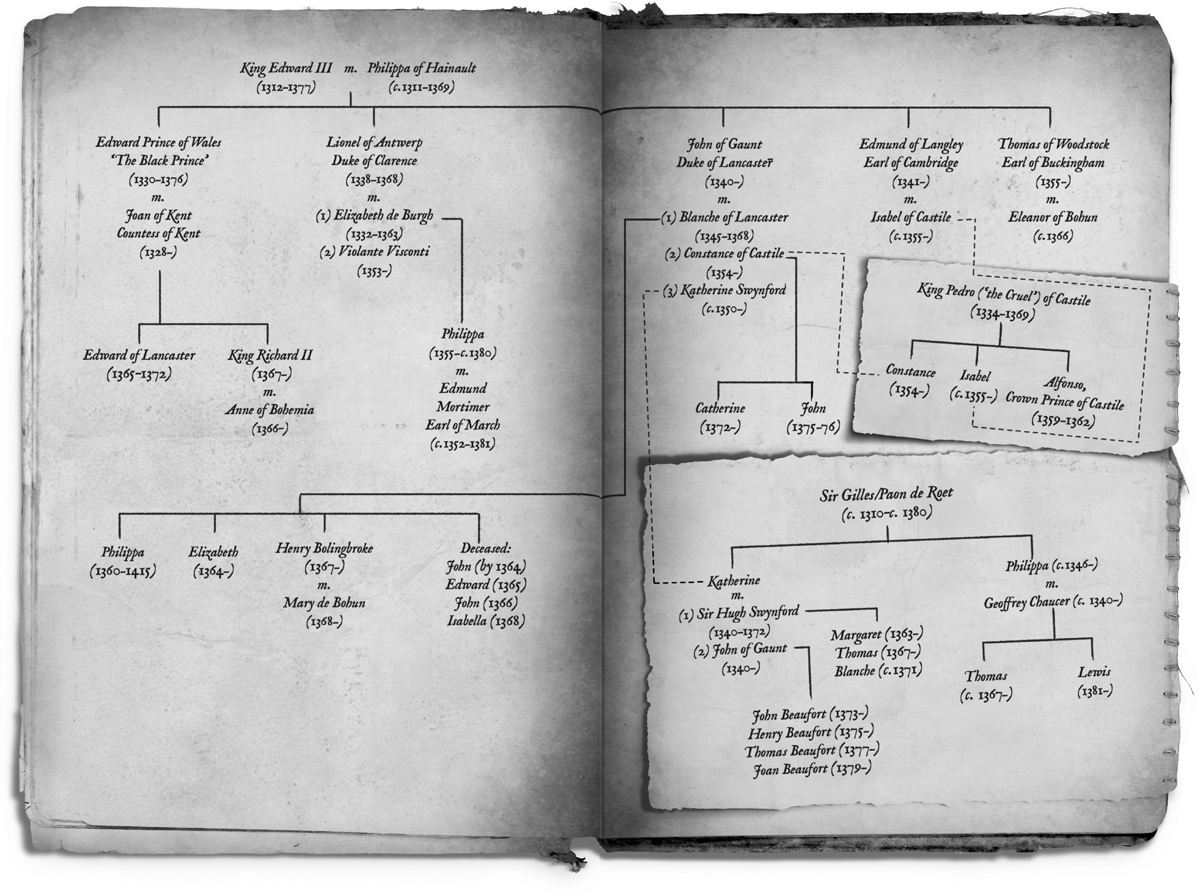

Moorfields, north of the walls
Under a clouded moon Agnes huddles in a sliver of utter darkness and watches him, this dark-cloaked man, as he questions the girl by the dying fire. At first he is kind seeming, almost gentle with her. They speak something like French: not the flavour of Stratford-at-Bowe nor of Paris, but a deep and throated tongue, tinged with the south. Olives and figs in his voice, the embrace of a warmer sea.
He repeats his last question.
The girl is silent.
He hits her.
She falls to the ground. He squats, fingers coiled through her lush hair.
‘Doovay leebro?’ he gently chants. ‘Ileebro, mee ragazza. Ileebro.’ It could be a love song.
The girl shakes her head. This time he brings a fist, loosing a spray of blood and spittle from her lips. A sizzle on a smouldering log. Now he pulls her up, dangling her head before him, her body a broken doll in his hands. Another blow, and the girl’s nose cracks.
‘Ileebro.’ Screaming at her now, shaking her small frame.
‘Nonloso!’ she cries. ‘Nonloso, seenoray.’ She spits in his face.
He releases her and stands. Hands on his knees, he lets fly a string of words. Agnes can make nothing of them, but the girl shakes her head violently, her hands clasped in prayer.
‘No no no, seenoray, no no no.’ She screams, sobs, now whimpers as her softening cries fade into the silence of the moor.
When she is still he speaks again. ‘Doovay leebro?’
This time the girl hesitates. Moonlight catches the whites of her eyes, her gaze darting toward the dense foliage.
In the thick brush Agnes stiffens, ready to spring. The moment lengthens. Finally, in the clearing, the girl lowers her head. ‘Nonloso.’ Her voice rings confident this time, unafraid.
The man raises a hand. In it he clutches a stick of some kind. No, a hammer. ‘This is your last chance, my dear.’
Agnes’s limbs go cold. Perfect gentleman’s English. More than that, she knows this man’s voice, has heard it close to her ear, though she can’t summon the face. One of a thousand.
Now the girl throws back her head, lips parted to the dark sky, the dread ascending in a last flux of words: ‘Though faun escape the falcon’s claws and crochet cut its snare, when father, son, and ghost we sing, of city’s blade beware!’
English again, brushed with an accent, confusing the night with these strange portents hurled at the stars. She’s taunting him, Agnes thinks. He hesitates, the hammer still in the air.
Finally it descends. There is a glint of iron, and a sound Agnes will never forget.

For hours Agnes waits, as the moon leaves the sky, as the din of night creatures falls slowly into a bottomless silence. Now dawn, birdsong mingling with the distant shouts of workingmen within the city walls. The priory rings Lauds, and light rises across the moor.
Time to move. She arms aside a span of branches, scoring her wrists on dense clusters of twigs and nubs. A tentative foot out among the primrose, a pale blanket of scent.
Her gaze glides over the clearing: the lean-to, the remnants of the fire, the body. Her killer has stripped the girl to the flesh. Not with unthinkable intent, but with a deliberation that makes clear his aim. He was searching her, picking at her, like a wolf at a fresh kill. No rings on the delicate fingers, no brooch at the slender neck, though a silver bracelet circles her wrist. With her right hand Agnes clumsily unclasps it, admiring the small pearl pendant, the delicate chain. She pockets it. The only other item of value is a damask dress, tossed over a rotten log. Too big and bulky to carry into the city, and too fine for Agnes to wear.
Her left arm, still pinned at her side, aches. The small bundle has been clutched too tightly to her breast, almost moulded to her body. A thousand thorns wake her limb as she examines what the doomed girl thrust wordlessly at her hours ago. A bright piece of cloth, tied in leather cord, wrapped around a rectangular object of some kind. She collapses on a high stone and rests the bundle on her knees. With one tug the cord comes free.
A book. She opens it, looking for pictures. None. She tosses the thin manuscript to the ground.
What she notices next is the cloth. A square of silk, the embroidery dense and loud, the whole of it still stiff with the volume’s shape. She spreads the cloth to its full span. Here is a language she reads: of splits and underside couching, of pulled thread and chain stitch, an occulted story told in thread of azure, gold, and green. At the centre of the cloth appear symbols that speak of ranks far above hers. Here a boy, there a castle, there a king; here lions rampant, there lilies of France; here a sword, there a shield.
Agnes knows something of livery, suspects the import of what she holds. A woman has just died for it, a man has just killed. For what? She remembers the girl’s last, haunting words.
Though faun escape the falcon’s claws and crochet cut its snare,
When father, son, and ghost we sing, of city’s blade beware!
The rhythm of a minstrel’s verse, one she has never heard. Yet the rhyme will not leave her mind, and she mouths it as she thinks her way back through the walls. Which road is less likely to be watched, which gate’s keepers less likely to bother with a tired whore, some random maudlyn dragging it into London at this hour?
Cripplegate. Agnes takes a final kneel next to the dead girl and whispers a prayer. She retrieves the book and wraps it once more in the cloth, hiding them both in her skirts.
Soon she has left the Moorfields and traced a route below the causeway, circling north of a city suddenly foreign to her, though she has spent nearly all her life between its many gates. She enters London dimly aware that she holds things of great value on her person and in her mind, though unsure what to do with any of them, nor what they mean, nor whom to trust.
A cloth, a book, a snatch of verse.
Which is worth dying for?
PART ONE The Prince of Plums
Day xv before the Kalends of April to the Ides of April, 8 Richard II
(18 March–13 April 1385)
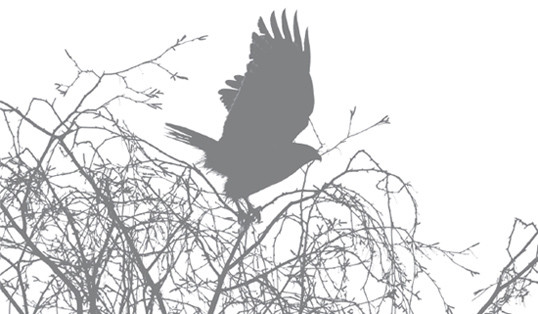
Конец ознакомительного фрагмента.
Текст предоставлен ООО «ЛитРес».
Прочитайте эту книгу целиком, купив полную легальную версию на ЛитРес.
Безопасно оплатить книгу можно банковской картой Visa, MasterCard, Maestro, со счета мобильного телефона, с платежного терминала, в салоне МТС или Связной, через PayPal, WebMoney, Яндекс.Деньги, QIWI Кошелек, бонусными картами или другим удобным Вам способом.



